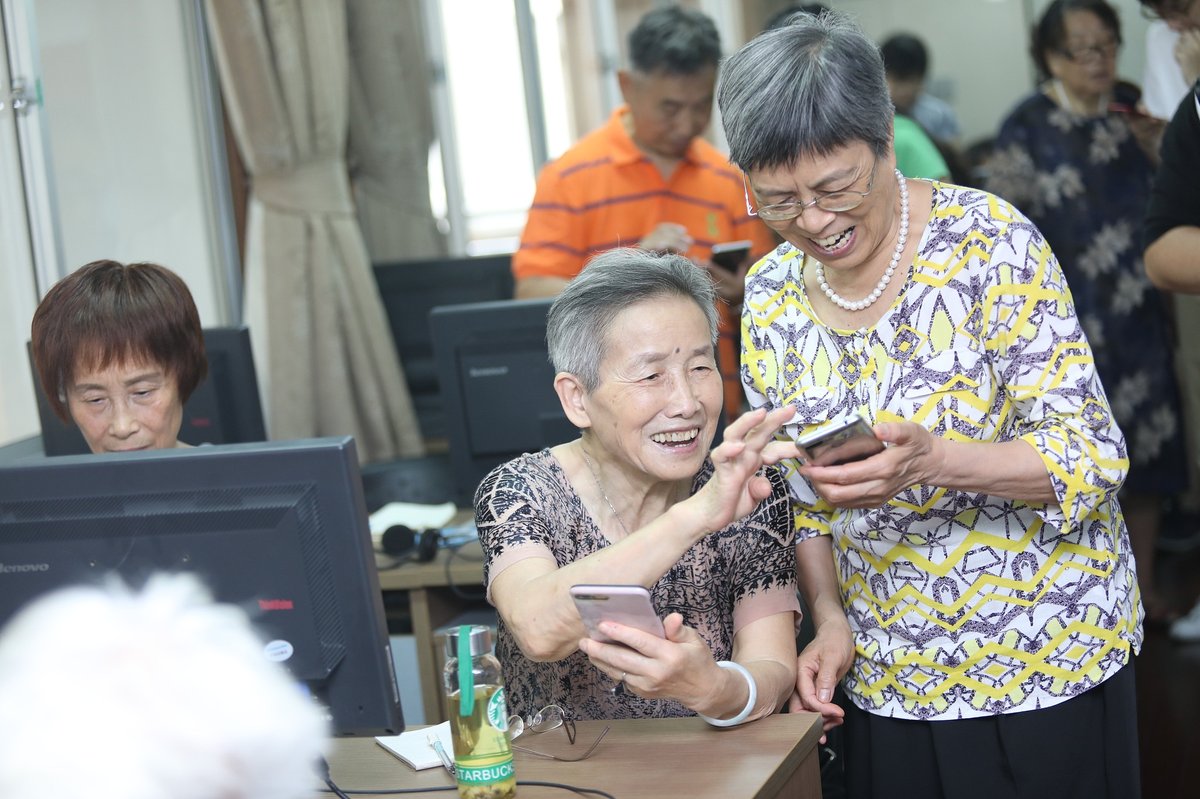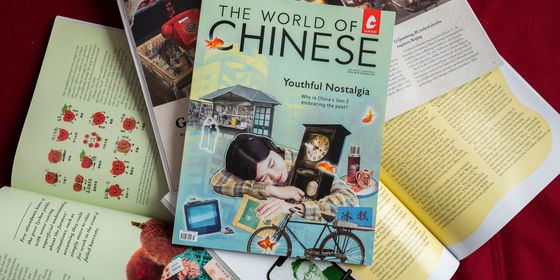Despite amassing millions of users, Meipian, a Chinese social media app targeting the senior community, continues to grapple with monetization challenges
At around 6 p.m. on a weekend in Beijing’s Beihai Park, despite temperatures of 30 degrees Celsius, a line of people in their 60s and 70s with cameras, tripods, and wide-brimmed hats start to form on the bank of Beihai Lake. They’ve come to shoot the park’s famous white stupa, and will patiently wait for hours to capture all of its different views: against blue skies, glowing under the dusk, and then illuminated under the park’s artificial lights at night.
Like young people flocking to popular restaurants to photograph the food and decorations, these elderly tourists are also seeking iconic destinations to daka (打卡, “check in”) at—and like their younger counterparts, there’s even a place where they gather to share their results online. Meipian, a social media app founded in 2015, is affectionately known as the “Old Red Book” for being similar in function to millennial and Gen Z lifestyle app Xiaohongshu, whose name translates to “Little Red Book,” but more popular among the middle-aged and elderly. If one searches for “Beihai Park,” Meipian shows hundreds of blog-like diary entries with up to 100 images included.
Unlike other social media platforms such as Weibo or WeChat’s Moment’s feed, the blogging function of Meipian allows users to post long articles and up to 100 images and videos. This has been commonly cited as crucial to its popularity among middle-aged and elderly users who might be less tech-savvy to select and edit their photos for the best few.
On Meipian, there are rarely any viral videos or influencers who recommend the latest trends to follow, but many communities dedicated to “recollections”: such as “Sharing Memories of the Countryside” and “Communicating on the Days of Being Sent-Down Youths” groups, both of which have over 10,000 members (known as meiyou, or “Mei[pian] friends”) who reminisce about their experiences of being “reeducated” in rural China during the Cultural Revolution.
And instead of responding with the latest slang terms or humorous gifs, users are more ready to sprinkle compliment-laden comments with abundant flowers and “thumbs-up” emojis. In turn, they receive kind responses adorned with similar emojis, creating a cycle of positive interactions. Debates and abusive comments, according to the users, are comparatively rare.
A haven for seniors online
According to a 2021 report by AgeClub, a Beijing-based media platform specializing in businesses that target seniors, Meipian has over 200 million registered users, over 50 percent of whom are above the age of 45. This positions Meipian as the third most popular app within this demographic, trailing behind the news aggregator Jinri Toutiao and the ubiquitous instant messaging app WeChat.
As one of the few social media platforms targeted at the demographic, Meipian aims to: “enrich the inner world of the middle-aged and elderly,” as per its upgraded mission announced in September 2021. It also updated its slogan the same year—“Come to Meipian in the prime of life”—in replacement of the original one, “Record what’s pleasant and share the touching moments.”
Meipian (美篇, literally meaning “beauty” and “piece [of writing]”) first started as a tool for editing texts and photos. Users can share the link of their finished blog-like pieces to other platforms like WeChat. Its founder Tang Qi, then a research and development engineer at Chinese tech giant Huawei in Nanjing, reportedly made the prototype of the app for his father. Tang’s father had picked up photography as a hobby in his retirement, but there were no senior-friendly platforms for sharing the many images he took and liked. At that time, blogging platforms developed by tech giants like Sina and Baidu were dying, while WeChat Moments, Weibo, and Xiaohongshu all limited the number of images and the characters their users were allowed to post.
Many friends of Tang’s own generation didn’t find the idea to be promising, as they had a hard enough time even finding nine images to post with each social media update. However, after Tang released an updated version of his app in January 2016, which included comment and discussion functions, the app’s user number soared to over 5 million by August, and doubled again by January 2017. Its official website boasted 200 million registered users by June 2020. The company was already valued at an estimated 1 billion yuan after four rounds of financing, totaling over 180 million yuan from investment management companies and funds in July 2018.
“Meipian has offered users a channel to express themselves in depth,” Tang explained to business news website 36kr in December 2021. The app addressed a need among middle-aged and elderly internet users that few existing apps had managed to meet. The platform’s popularity has largely grown in the “users self-promoting model (用户自传播),” where new users are attracted by the Meipian content shared on other apps like WeChat. The platform has also tried to make its interface friendlier to its demographic: for example, words like “follow (关注)” and “section (分区)” are replaced with “subscribe (订阅)” and “column (栏目)”—terms familiar to newspaper-readers, to make their meaning more clear to seniors.
Wang Dezeng, a 59-year-old researcher from Weishan county in eastern China’s Shandong province, learned about Meipian from ads on WeChat in early 2016. At the time, with many Chinese blog sites either shutting down or getting increasingly harder to load, he was worried about losing the hundreds of diary entries and poems he had been publishing on Sina Blog since 2012.
He transferred his content over to Meipian shortly after discovering the platform and found the warm feedback he received from other users to be motivating for him to post more. Each of the approximately 100 posts he published this year has garnered around 10,000 views, received 100 positive comments, and earned him “virtual flowers,” which users can purchase or earn by completing different tasks within the app. Meipian’s community culture encourages users to reciprocate when others follow, reply, and “gift” them. “It’s embarrassing if others comment on your writing or even write a review about it, but you don’t do anything in return,” says Wang, who has 6,900 followers and follows over 3,800 other users in return.
A remedy for loneliness
For Wang, Meipian is an outlet where he can comfortably share concerns—about his aging parents’ health, his children’s careers, caring for grandchildren, and requisition of his family’s land in the village—with likeminded users who can empathize with his experiences. There are few other such spaces on the internet in China. “Writing is the way of self-expression for a lonely person...I don’t have many close friends, so I could only truly connect with myself,” he wrote in one blog post on Meipian last September.
Loneliness has been a major driving force for many elderly Chinese to seek interaction online. There were over 100 million “empty-nest elderly (空巢老人)” in China, namely people over 60 who are either childless or don’t live with their children, according to a 2015 survey jointly organized by China National Committee on Aging, the Ministry of Civil Affairs, and the Ministry of Finance. In 2021, iiMedia Research, an international consultancy, reported that 51 percent of middle-aged and elderly internet users spent more than four hours online per day, including around 15 percent who spent more than six hours per day—almost double the daily average duration of 3.84 hours among all Chinese netizens.
The Report of the Elderly’s Online Life, jointly released by the news aggregator Qutoutiao and state media The Paper in October 2020, even finds that over 100,000 elderly Chinese spent over 10 hours online per day on average, largely out of loneliness.
Qing Feng, a 54-year-old who asked to be identified by her online handle, discovered Meipian in 2016 as a place for publishing English papers she wrote during her time studying at a community college in the US, all while caring for her two children. Later, especially in the last two years after her younger son left for college, she explored multiple other apps like WeChat, Douyin (China’s version of TikTok), and even Xiaohongshu, but still prefers Meipian as the “most comprehensive” site that allows her to post long blog pieces, videos of her reciting articles out loud, and microblogs about her various hobbies like flower arrangement.
For Ding Shuqin, a retired hydraulic engineer from Harbin, the capital of China’s northeastern Heilongjiang province, Meipian’s interactions have led her to spend several hours per day on the app. “Interactions take up most of my time on the app. If you publish something and others follow you or write a nice review, it’s not nice to ignore them,” she tells TWOC.
Many Meipian users would also send private messages to each other and even meet with their meiyou offline. Wang, however, has specified “No private chats” on his profile so he won’t waste too much energy talking to everyone. Qing Feng also refuses most private chat requests due to fear of being scammed out of money. The middle-aged and elderly population has been particularly vulnerable to online scams, especially those related to healthcare and romantic relationships, as revealed by Tencent Guard, a non-profit online security platform operated by the tech giant Tencent. In the first half of 2019 alone, Tencent Guard received over 20,000 cases of cyber-safety from this demographic, with 97 percent of them experiencing financial losses.
Monetizing seniors
Even with its reported user base of millions, Meipian is still striving to engage more. In May 2020, the platform introduced a microblogging function similar to Weibo that allows posts within 140 words for less-educated or less-literate users.
Ding, a user of Meipian since 2018, has found herself frequenting the app more after its microblogging function was released. “I’m not good at writing [long pieces],” she tells TWOC. Since then, Ding has posted hundreds of microblogs and got more than one million views in total till late this August.
However, despite the app’s popularity within the senior community, it’s not clear if Meipian has figured out how to monetize it. The company has not released any numbers on its users and investments since 2018. Instead, Chinese magazine Portraits reported in November 2022 that the company has laid off some departments as a whole and downsized to its start-up phase of around only 100 employees.
Meipian does have a subscription model that allows its members to get access to more privileged functions, like more formatting and background music choices for their long blog posts. However, this attempt at monetization doesn’t sit well with some of its users. Wang, who now pays a 198-yuan annual members fee, hopes the platform could be more “non-profit” and don’t charge any fees. “Users like me have come to the platform and made it big…Though it’s a small charge to us, it may hinder the site’s development,” he explains.
A report by AgeClub in April 2021 pointed out that Meipian is not the only platform targeting the middle-aged and elderly that have faced challenges in commercialization. They primarily rely on advertisements because this demographic, especially older individuals “don’t trust online payment, as they don’t know much about the internet.”
An employee of Meipian under the pseudonym Wang Fan also told Portraits that they had difficulty recruiting users for their paid offline activities, including photography-themed tours and book clubs. “Few people would come if the fee is higher than 300 yuan, which is the overhead cost…Long-distance trips at 1,000 yuan or more hardly ever happen since [we are rarely able to] recruit the minimum of 10 members,” Wang said.
Previously, Meipian tried to increase the cut of profits it receives from the “tips” readers give to content creators from 5 percent to 30 percent. This became its most profitable source of business in the first half of 2019. However, it alienated a large group of users, who called this policy a “robbery.” In response, the platform lowered its cut back to 2 percent, and reduced ads on the platform, which led to a revenue deficit of 30 million yuan in 2019.
Some of the platform’s earliest users are growing dissatisfied with their experience. According to Qing Feng, some of her friends, including a Chinese professor who introduced her to Meipian, have not updated on the platform for years. Qing Feng feels that Meipian struggles to maintain its earlier, more educated users like her as it has “lowered its threshold,” while Wang feels that some promoted posts on Meipian have become “really terrible in quality,” including some that feature advertisement and violent language.
Still, he cherishes the platform for being the few places he can still go to express himself, even requesting TWOC not to report on negative experiences of the platform that might impact its development.
Having heard about the platform’s financial problems, Wang is concerned it may disappear just like other blog sites. “What will happen to our content?” he wonders. Whether the platform will eventually figure out a way to monetize its community, or fade into history like earlier bulletin board systems and blogging platforms, remains to be seen.
















